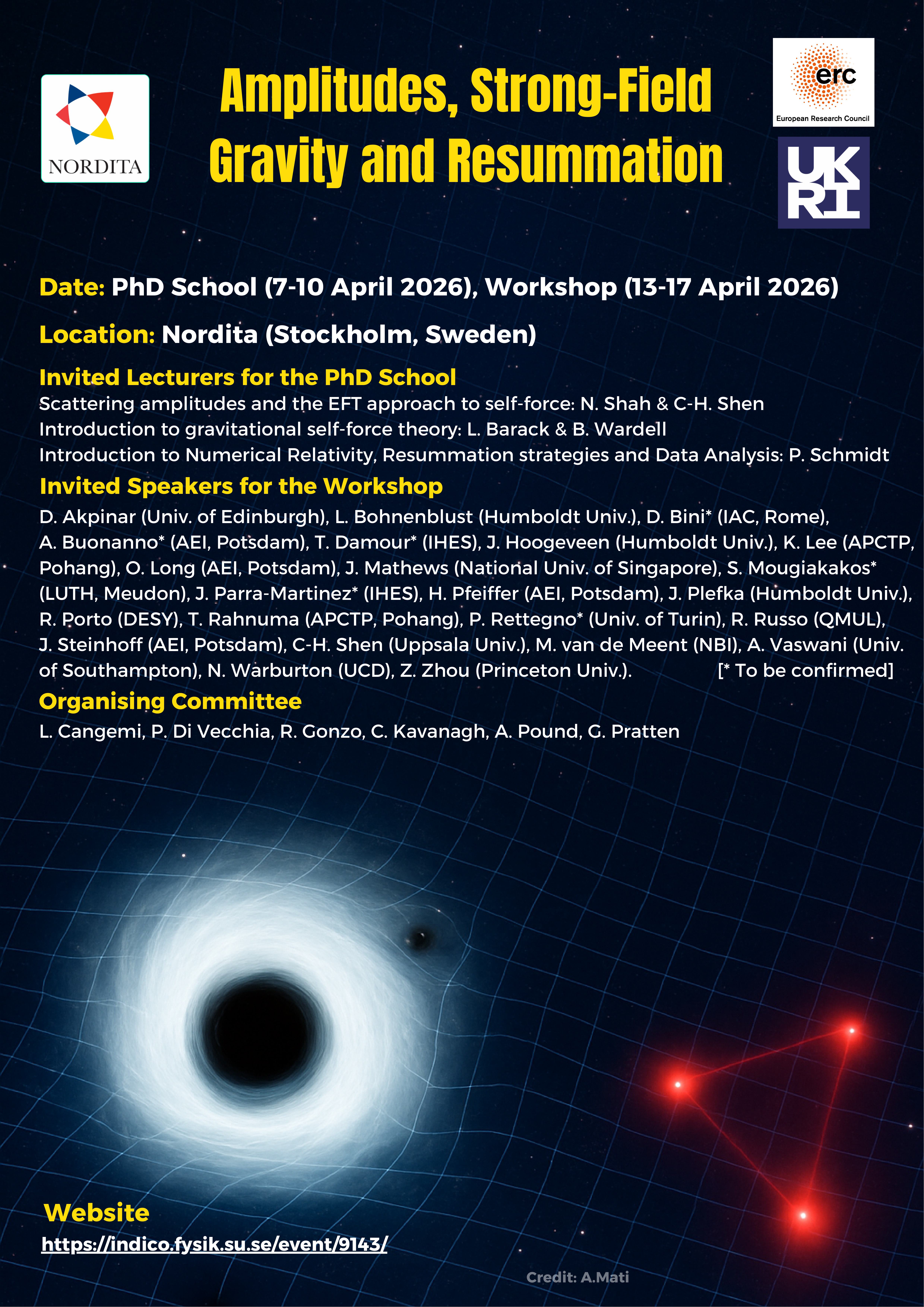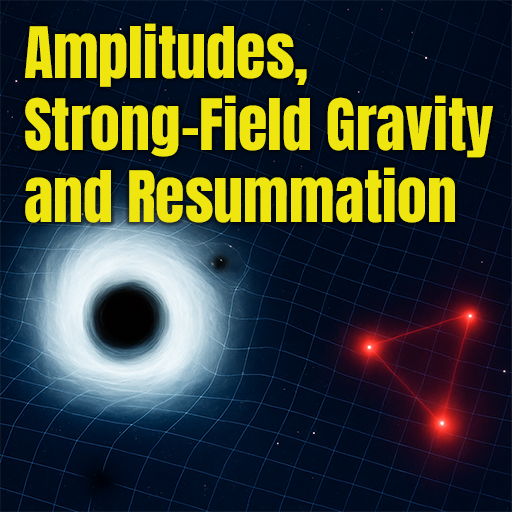CAUTION! Occasionally scammers contact participants claiming to assist you with accommodation and travel arrangements etc.
Please be vigilant and do not share information with them! Also, please notify the organizers if you are in any doubt about the legitimacy of an approach, and never hesitate to contact us with any further questions.
Program at a glance (7-17 April 2026)

Click to view full poster (PDF)
The program is structured as follows:
-
Week 1 [April 7–10, 2026 (4 days)]: The PhD school will focus on foundations and tools for gravitational self-force, amplitudes, self-force EFT, resummation strategies and data analysis relevant to waveform modelling. Theoretical lectures will be complemented by hands-on programming sessions and dedicated tutorials.
-
Week 2 [April 13–17, 2026 (5 days)]: Workshop focused on uniting the weak-field (PM) and strong-field (GSF) approaches to the two-body problem, as well resummation strategies relevant for gravitational-wave phenomenology. Individual talks will be complemented by discussion sessions to promote cross-community interaction and constructive debates.
PhD School (7-10 April 2026)
Topics will include:
1) Scattering amplitudes and the EFT approach to self-force
Lecturers: Nabha Shah (NBI) & Chia-Hsien Shen (Uppsala Univ. and NTU, Taiwan)
2) Introduction to gravitational self-force theory
Lecturers: Leor Barack (Univ. of Southampton) and Barry Wardell (UCD)
3) Introduction to Numerical Relativity, Resummation strategies and Data Analysis
Lecturer: Patricia Schmidt (Univ. of Birmingham)
Workshop (13-17 April 2026)
There is pressing need for high-precision models of gravitational waveforms from binary black hole mergers, driven by the increasing sensitivity of gravitational-wave detectors. The central theme of this program is how to leverage particle physics methods when calculating processes relevant to gravitational-wave phenomenology. In particular, the workshop focuses on uniting two key perturbative approaches — post-Minkowskian (PM) theory, effective for weak-field, widely separated systems, and gravitational self-force (GSF) theory, suited to extreme-mass-ratio systems in strong fields. Crucial to combining these tools is understanding the resummation of the perturbative series. We aim to bring together both experts and younger theorists from these communities, fostering new collaborations and combining our efforts to address the pressing questions at the interface between these fields.
Invited speakers: [* To be confirmed]
D. Akpinar (University of Edinburgh), L. Bohnenblust (Humboldt University), T. Damour (IHES), J. Hoogeveen (Humboldt University), M.Khalaf (Hebrew University), K. Lee (APCTP, Pohang), O. Long (AEI, Potsdam), J. Mathews (National University of Singapore), S. Mougiakakos* (LUTH, Meudon), J. Parra-Martinez* (IHES), H. Pfeiffer (AEI, Potsdam), J. Plefka (Humboldt University), R. Porto (DESY), T. Rahnuma (APCTP, Pohang), P. Rettegno (University of Turin), R. Russo (QMUL), J. Steinhoff (AEI, Potsdam), C-H. Shen (Uppsala University), M. van de Meent (NBI), A. Vaswani (University of Southampton), N. Warburton (UCD), Z. Zhou (Princeton).
Venue
The program will be hosted by Nordita in Stockholm (Sweden) from 7th - 17th April 2026.
Application/Registration
Due to limited space, registration will be moderated for both the PhD school and the workshop. You may apply to the PhD school only, the workshop only, or both. Registration to be considered for on-site participation will close on 31 January 2026; after this date, registrants will receive an on-site/remote participation confirmation from the organizers.
Remote participation: All talks will be livestreamed via Zoom, and recordings will be made available to registered participants who cannot attend in person.
Organizers
-
Lucile Cangemi — University of Edinburgh, United Kingdom
-
Paolo Di Vecchia — Nordita, Sweden
-
Riccardo Gonzo — Queen Mary University of London, United Kingdom
-
Chris Kavanagh — University College Dublin, Ireland
-
Adam Pound — University of Southampton, United Kingdom
-
Geraint Pratten — University of Birmingham, United Kingdom
Funding sources:
This workshop is partially supported by the UKRI/ERC grant GWModels.
Sponsored by:


